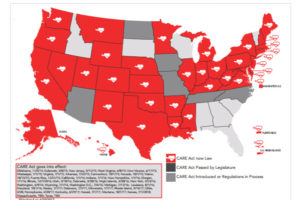National Caregiving Policy Review

National Landscape
As a voice for family caregivers, the National Alliance for Caregiving often participates in public discussions about the needs of caregivers and policy solutions that may better support their care. The Alliance regularly engages in national caregiving policy review and partnerships with other advocates for the aging and persons with disabilities to find cross-cutting solutions that will support caregiving.
Policy Spotlight
This is legislation we are following and actively supporting. The National Alliance for Caregiving encourages caregiver advocates to contact their legislators and ask them to support the following:
Recognize, Assist, Include, Support, and Engage (RAISE) Family Caregivers Act
Requires the Secretary of Health and Human Services to develop, maintain and update an integrated national strategy to recognize and support family caregivers. Brings together relevant federal agencies and others from private and public sectors to advise and make recommendations regarding the national strategy.
Sponsor: Representative Greg Harper (R-MS); Senator Susan Collins (R-ME)
Last action: House–In Education and Workforce Committee; Senate—Passed
Americans Giving Care to Elders (AGE) Act
Provides a tax credit for family caregivers caring for a parent or grandparent for up to $6,000; increases funding for the National Family Caregiver Support Program and; creates a National Resource Center on Family Caregiving.
Sponsor: Representative Steve Israel (D-NY); Senator Amy Klobuchar (D-MN)
Last action: House—In Ways and Means Committee; Senate—In Finance Committee
Credit for Caring Act
Provides for a tax credit of up to $3,000 for qualified families to help defray the costs of caring for a loved one. This credit would be available to caregivers of persons across the lifespan (adult or for a child with a disability).
Sponsor: Representative Tom Reed (R-NY); Senator Joni Ernst (R-IA)
Last action: House—In Ways and Means Committee; Senate—In Finance Committee
National Care Corps Act
Modeled after the Peace Corps, this program provides support for family caregivers and helps meet the growing demand for the care of aging and disabled Americans. The program will place volunteers in communities to work with seniors and individuals with disabilities who need extra support to live independently. Volunteers would receive a minimum of 40 hours of training.
Sponsor: Representative Michelle Lujan Grisham (D-NM)
Last action: House—In Education and Workforce Subcommittee on Higher Education and Workforce Training
Alzheimer’s Beneficiary and Caregiver Support Act
Allows CMS to test supportive models for family caregivers of Medicare beneficiaries diagnosed with dementia. The models include individual and family counseling sessions, follow-up assessments, support groups and ad hoc counseling or consultations, depending on the health of the applicable Medicare beneficiary.
Sponsor: Representative Linda Sanchez (D-CA); Senator Shelly Moore Capito (R-WV)
Last action: House—In Ways and Means and Energy and Commerce Committee; Senate—In Finance Committee
Health Outcomes, Planning, and Education (HOPE) for Alzheimer’s Act
Provides Medicare coverage for care planning services for both the patient and caregiver; ensures documentation of a dementia diagnosis is included in the patient’s medical records; and requires the Department of Health and Human Services (DHHS) to educate healthcare providers about the new benefit and to identify barriers in access to care planning.
Sponsor: Representative Chris Smith (R-NY); Senator Debbie Stabenow (D-MI)
Last action: House—In Ways and Means Subcommittee on Health; Senate—In Finance Committee
Independence at Home Act
Expands and scales the Independence at Home (IAH) demonstration program. IAH requires primary care providers to provide care in the home setting, 24/7, and to meet specific quality measures, including providing advance care planning.
Sponsor: Senators Ed Markey (D-MA)
Last action: Senate—In Finance Committee
Social Security Caregiver Credit Act
Provides a social security credit to be added to a person’s total career earnings and used to calculate future social security benefits. This is a progressive benefit for caregivers who spend at least 80 hours a month providing care. This includes caregivers of a parent, aunt, uncle, grandchild, niece, nephew, spouse, or domestic partner.
Sponsor: Representative Nita Lowey (D-NY); Senator Chris Murphy (D-CT)
Last action: House—In Ways and Means Subcommittee on Social Security; Senate—In Finance Committee
Tracked Legislation
This is legislation we are following. The National Alliance for Caregiving supports and will be tracking the progression of:
Lifespan Respite Care Reauthorization Act
The Lifespan Respite Care Program provides competitive grants to state agencies working in concert with Aging and Disability Resource Centers and non-profit state respite organizations to make quality respite available and accessible to family caregivers. This bill amends the Public Health Service Act to extend lifespan respite care programs through FY2020.
Sponsor: Representative Jim Langevin (D-RI)
Last action: House—In Energy and Commerce Committee
Family and Medical Leave for Part-time Workers Act
Amends the Family and Medical Leave Act of 1993 to make an employee eligible for coverage if that employee has been employed for at least 12 months by a covered employer from whom the leave is requested. The bill repeals the current requirement that the employee have served at least 1,250 hours during the 12-month period before the leave request.
Sponsor: Representative Jan Schakowski (D-IL)
Last action: House—In Administration Committee
Caregivers Access and Responsible Expansion (CARE) for All Veterans Act
Increases access to the current VA Caregiver Support Program to all service-era veterans. Currently, the VA Caregiver Support Program is limited to post-9/11 veterans and excludes all members who have served in previous service-eras.
Sponsor: Representative Elizabeth Esty (D-CT)
Last action: House—In Veterans Affairs Subcommittee on Health
Alzheimer’s Caregiver Support Act
Provides grants to public and non-profit organizations to expand and improve training and support services for families and caregivers of individuals with Alzheimer’s disease. The bill ensures that grantees provide public outreach on the services they offer under this program and that grantees provide services in a culturally appropriate manner.
Sponsor: Representative Maxine Waters (D-CA); Senator Amy Klobuchar (D-MN)
Last action: House—In Energy and Commerce Subcommittee on Health; Senate—In Health, Education, Labor, and Pensions Committee
General
This is legislation that would generally help family caregivers. The National Alliance for Caregiving is supportive of the following:
Care Planning Act
Creates a new Medicare benefit called Planning Services that would offer voluntary advance care planning for those with advanced illness. The bill also directs HHS to develop quality measures focused on end-of-life care, commission a study and report to HHS on the state of advanced care planning, and include advance care planning materials in the Medicare & You handbook.
Sponsor: Senator Mark Warner (D-VA)
Last action: Senate—In Finance Committee
Missing Alzheimer’s Disease Patient Alert Program Reauthorization Act
Reauthorizes a Department of Justice program that helps local communities and law enforcement officials quickly identify persons with Alzheimer’s disease who wander away from their homes and reunite them with their families.
Sponsor: Representative Maxine Waters (D-CA)
Personalize Your Care Act 2.0
Increases public awareness through additional Medicare coverage for Advanced Illness Management and Choices Demonstration which allows more accessibility and more choices in care services. Also requires that advance directives be included within a patient’s electronic health record in order to increase the likelihood that the documents are accurate and accessible.
Sponsor: Representative Earl Blumenauer (D-OR)
Last action: House—In Ways and Means Committee











